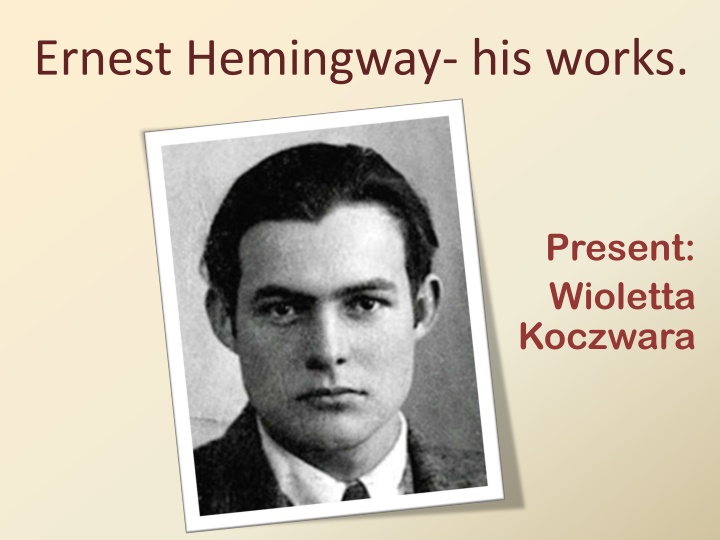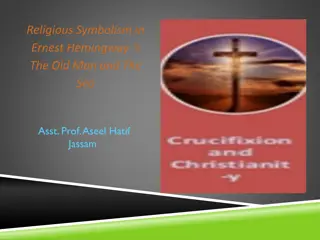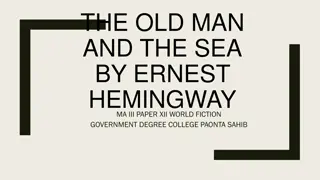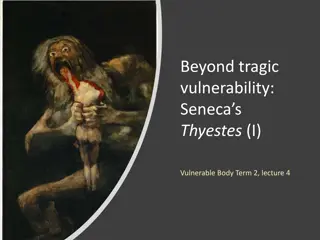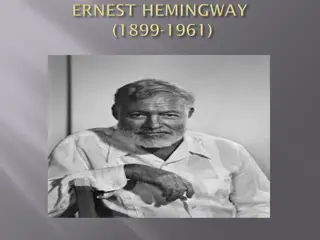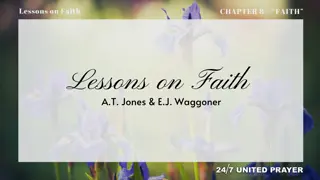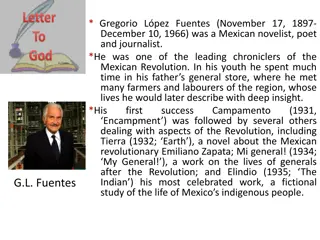Ernest Hemingway: A Brief Overview of His Life and Works
Ernest Miller Hemingway, born on July 21, 1899, was a renowned American novelist, short story writer, and journalist who left a significant mark on 20th-century fiction. Hemingway's distinct writing style and adventurous life influenced many generations. He produced numerous iconic works, including novels, short story collections, and non-fiction pieces, many of which are considered classics of American literature. Hemingway's renowned works such as "A Farewell to Arms," "Death in the Afternoon," and "The Old Man and the Sea" showcase his literary prowess and storytelling mastery.
Download Presentation

Please find below an Image/Link to download the presentation.
The content on the website is provided AS IS for your information and personal use only. It may not be sold, licensed, or shared on other websites without obtaining consent from the author.If you encounter any issues during the download, it is possible that the publisher has removed the file from their server.
You are allowed to download the files provided on this website for personal or commercial use, subject to the condition that they are used lawfully. All files are the property of their respective owners.
The content on the website is provided AS IS for your information and personal use only. It may not be sold, licensed, or shared on other websites without obtaining consent from the author.
E N D
Presentation Transcript
Ernest Hemingway- his works. Present: Wioletta Koczwara
Who was Ernest Hemingway? Ernest Miller Hemingway (July 21, 1899 July 2, 1961) was an American novelist, short story writer, and journalist. His economical and understated style had a strong influence on 20th-century fiction, while his life of adventure and his public image influenced later generations.
Hemingway produced most of his work between the mid-1920s and the mid-1950s, and won the Nobel Prize in Literature in 1954.
He published seven novels, six short story collections, and two non-fiction works. Additional works, including three novels, four short story collections, and three non-fiction works, were published posthumously. Many of his works are considered classics of American literature.
A Farewell to Arms The world breaks everyone and afterward many are strong in the broken places. But those that will not break it kills. It kills the very good and the very gentle and the very brave impartially. If you are none of these you can be sure it will kill you too but there will be no special hurry.
Death in the Afternoon If a writer of prose knows enough of what he is writing about he may omit things that he knows and the reader, if the writer is writing truly enough, will have a feeling of those things as strongly as though the writer had stated them. The dignity of movement of an ice-berg is due to only one-eighth of it being above water. A writer who omits things because he does not know them only makes hollow places in his writing.
The Old Man and the Sea The Old Man and the Sea is a short novel written in 1951 in Bimini, Bahamas, and published in 1952. It was the last major work of fiction by Hemingway that was published during his lifetime. The story is of Santiago, an aging Cuban fisherman who struggles with a giant marlin far out in the Gulf Stream off the coast of Florida.
Green Hills of Africa The story starts when Kandisky s truck splutters along a nearby road, sends potential animal targets skittering away, stalls, and must be fixed on the spot. Learning Hemingway s identity, Kandisky, who bravely calls hunting silly, encourages his host to discuss writers instead.
Hemingway poses with horns kudu antelope while on safari in Africa in 1934.
The Snows of Kilimanjaro The story opens with a paragraph about Mount Kilimanjaro, the highest mountain in Africa, which is also called the House of God. There is, we are told, the frozen carcass of a leopard near the summit. No one knows why it is there. Then we are introduced to Harry, a writer dying of gangrene, and his rich wife Helen, who are on safari in Africa.
For Whom the Bell Tolls For Whom the Bell Tolls is a novel published in 1940. It tells the story of Robert Jordan, a young American in the International Brigades attached to a republican guerrilla unit Spanish Civil dynamiter, he is assigned to blow up a bridge during an attack on the city of Segovia. during War. the As a
Big Two-Hearted River The story opens with Nick arriving by train at Seney, Michigan, to find that a fire has devastated the town, leaving "nothing but the rails and the burned- over country."While following a road leading away from the town, he stops on a bridge where he observes trout in the river below. After, he hikes up a hill and rests at a burned stump.
Ernest Hemingway Quotes The world breaks everyone, and afterward, some are strong at the broken places There is no hunting of man, and those who have hunted armed men long enough and liked it, never care for anything else thereafter
Never go on trips with anyone you do not love There is nothing noble in being superior to your fellow men. True nobility lies in being superior to your former self Every men s life ends the same way. It id only the details of how he lived and how he died that distinguish one man from another
Thanks for your attention Wioletta Koczwara
